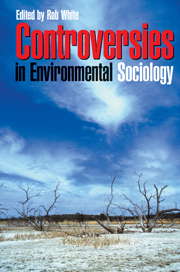Book contents
- Frontmatter
- Contents
- Tables and Figures
- Author Notes
- Abbreviations
- Introduction: Sociology, Society and the Environment
- PART I SOCIAL PERSPECTIVES
- PART II SOCIAL TRENDS
- 6 When the Population Clock Stops Ticking
- 7 Inequality, Social Differences and Environmental Resources
- 8 Sustainable Technology: Beyond Fix and Fixation
- 9 Think Global, Act Local
- 10 Citizenship and Sustainability
- 11 The Environment Movement
- PART III SOCIAL ISSUES
- Index
- References
11 - The Environment Movement
Where to from Here?
Published online by Cambridge University Press: 05 June 2012
- Frontmatter
- Contents
- Tables and Figures
- Author Notes
- Abbreviations
- Introduction: Sociology, Society and the Environment
- PART I SOCIAL PERSPECTIVES
- PART II SOCIAL TRENDS
- 6 When the Population Clock Stops Ticking
- 7 Inequality, Social Differences and Environmental Resources
- 8 Sustainable Technology: Beyond Fix and Fixation
- 9 Think Global, Act Local
- 10 Citizenship and Sustainability
- 11 The Environment Movement
- PART III SOCIAL ISSUES
- Index
- References
Summary
In recent decades political elites and the mass public in advanced industrialised democracies have taken on an increasingly green tinge. ‘Environmentalists’ of one sort or another are to be found just about everywhere, with claims of environmental credibility emanating from the most unlikely sources. Citizens recycle, politicians issue obligatory policy statements on ‘the environment’, and protestors take to the streets or chain themselves to trees in support of urgent environmental concerns. Compared to the middle of the 20th century, most people living in affluent countries could now be described as ‘environmentalists’ in some sense.
BACKGROUND TO THE ISSUES
Organised campaigns for environmental protection began in Australia in the 19th century (Papadakis 1993), as they did in Western Europe (Dalton 1994). Notable among the very early Australian campaigns were those aimed at establishing national parks for recreational purposes (Papadakis 1993: 66; see also Hutton & Connors 1999). Environmental issues became particularly salient in the 1960s in Europe and the United States with the emergence of a ‘new wave’ of environmentalism (Dalton 1994). Warnings of environmental crises were heralded in a range of influential books, such as Rachel Carson's Silent Spring (1962) and Paul Ehrlich's Population Bomb (1971). These works focused public attention on a range of environmental ‘risks’ (Beck 1992), in particular air and water pollution. The overlap with the student movement was also an important factor in the emergence of the environmental movement, with university graduates in the 1960s and 1970s forming ‘a leadership cadre and activist core for many of the newly forming environmental groups’ (Dalton 1994: 37).
- Type
- Chapter
- Information
- Controversies in Environmental Sociology , pp. 185 - 203Publisher: Cambridge University PressPrint publication year: 2004
References
- 6
- Cited by



